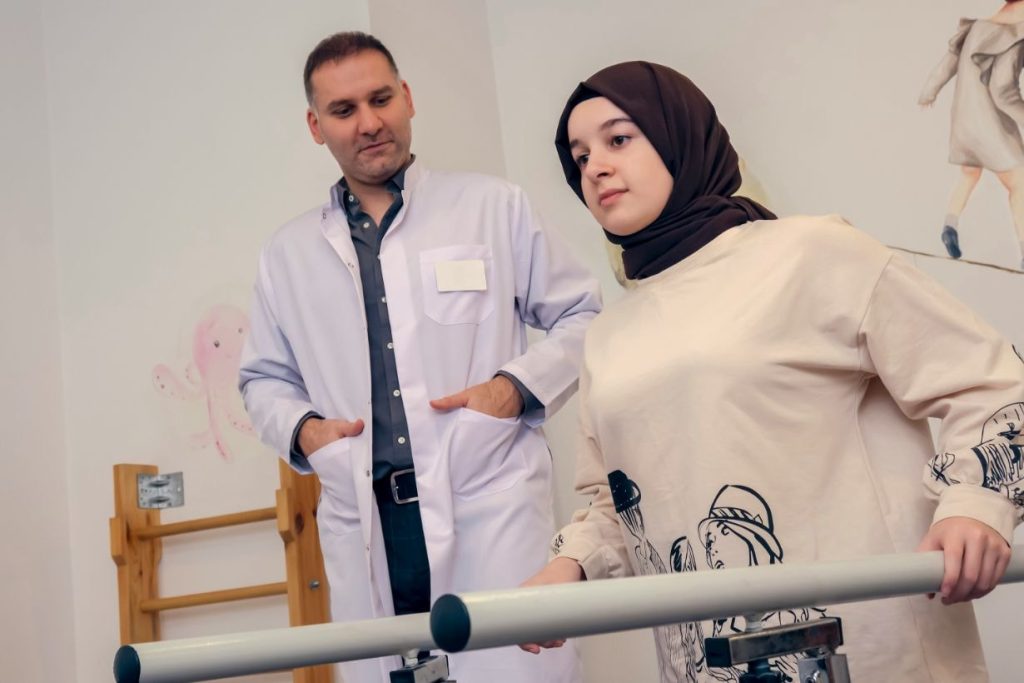
Are Physiotherapists Doctors?
Are physiotherapists doctors, and how does their role differ across healthcare systems? Exploring the qualifications, legal status, and scope of practice of physiotherapists in Australia and India reveals significant insights into this allied health profession. Examining regulatory frameworks, professional titles, and common misconceptions explains physiotherapy and its crucial role in patient care. Comparing these two countries highlights how cultural and legal distinctions shape the practice of physiotherapy, offering valuable perspectives on this essential healthcare field.
Doctor & Physio: Definitions
Doctor
- Medical doctor: A licensed healthcare professional
- Completed medical school
- Qualified to diagnose and treat illnesses, injuries, and health conditions
- Typically holds an MBBS degree or MD in modern scientific medicine
- Registered with the appropriate medical board in their country
Physiotherapist
- Physiotherapy (physical therapy) is a healthcare profession focused on restoring and maintaining physical function, mobility, and well-being.
- Physiotherapists are expert allied health practitioners specializing in movement and function.
- They treat various conditions affecting the musculoskeletal, neurological, and cardiorespiratory systems.
- Techniques used by physiotherapists include exercise, manual therapy, and education.
- Their goal is to help patients recover from injury, manage chronic conditions, and prevent future health problems.
While both play crucial roles in the medical field, their scopes of practice, education, and legal status vary between countries, as seen in Australia and India.

Physiotherapists in Australia
Physiotherapists in Australia are highly trained allied health professionals who play a vital role in the country’s healthcare system. Strict regulations and standards govern their practice to ensure high-quality patient care.
Qualifications and Education:
- 4-year Bachelor’s degree in Physiotherapy or
- 2-3 year Master’s/Doctor of Physiotherapy (following any bachelor’s)
- Programs include extensive clinical placements and courses
- Accredited by the Australian Physiotherapy Council
Legal Status and Registration:
- Must register with the Physiotherapy Board of Australia (overseen by AHPRA)
- Annual registration renewal required
- 20 hours of continuing professional development annually
- Must maintain professional indemnity insurance
- Physiotherapists are not permitted to practice medicine or prescribe drugs independently
Scope of Practice:
- Assess, diagnose, and treat movement-related disorders
- Develop and implement treatment plans
- Provide manual therapy, exercise programs, and patient education
- Use various therapeutic modalities (e.g., ultrasound, electrotherapy)
Role in Healthcare:
- Primary care providers for musculoskeletal issues
- Work in hospitals, private practices, sports teams, and community health
- Collaborate with general practitioners and other healthcare professionals
- Contribute to injury prevention and health promotion
Use of “Dr” Title:
- Permitted for those with doctoral degrees (e.g., PhD, DPT)
- Must clarify their role (e.g., “Dr. Smith, Physiotherapist”)
- Cannot imply medical practitioner status
- Subject to Board guidelines on the appropriate use
- The Australian College of Physiotherapists recognises the professional achievements of its Fellows, who are granted the right to use the title ‘Doctor’.

Physiotherapists in India
Physiotherapy is a recognised healthcare profession in India, but its regulatory framework and legal status differ from other countries.
Legal Status and Recognition:
- Recognised as allied health professionals
- Not considered medical practitioners under the Indian Medical Council Act
- Can practice independently but with limitations compared to medical doctors
Regulatory Framework:
- Governed by the Rehabilitation Council of India (RCI) Act, 1994, also known as the India Act
- RCI maintains the Central Rehabilitation Register
- Only qualified individuals registered with RCI can practice physiotherapy
- The RCI Act prohibits physiotherapists from practising medicine and prescribing drugs without the proper qualifications
- Aims to standardise training and maintain professional standards
- However, physiotherapy regulation in India is less comprehensive compared to the regulation of the allopathic systems of medicine
Use of “Dr” Title:
- Supreme Court’s verdict prohibits physiotherapists from using ‘Dr’ title
- Physiotherapists are prohibited from claiming the title of ‘specialist medical practitioner’ or using the prefix ‘Dr’ in prescriptions
- Only registered medical practitioners can use the ‘Doctor’ prefix
- Physiotherapists must use their professional designation without ‘Dr’
- Aims to prevent misleading the public about qualifications

Comparison between Australia and India
Similarities:
- Physiotherapists in both countries are recognised healthcare professionals
- Focus on physical rehabilitation and movement disorders
- Require specific education and training in physiotherapy
- Play important roles in healthcare systems
Differences:
- Legal Status:
- Australia: Autonomous practitioners with a broad scope of practice
- India: Recognised but with more limited legal status and practice rights
- Regulatory Framework:
- Australia: Comprehensive regulation by Physiotherapy Board and AHPRA
- India: Oversight by Rehabilitation Council of India, less comprehensive regulation
- Use of “Dr” Title:
- Australia: Permitted for those with doctoral degrees, with clear identification
- India: Prohibited by Supreme Court ruling for all physiotherapists
- Education:
- Australia: Standardised university programs with clinical placements
- India: Varied programs working towards standardisation
- Scope of Practice:
- Australia: Can be primary care providers, broader diagnostic rights
- India: More limited scope, often working under physician oversight
- Public Perception and Acceptance
- Australia: Greater public understanding and acceptance of physiotherapy as primary care
- India: Growing recognition, but often seen as supplementary to medical treatment
- Direct Access to Physiotherapy
- Australia: More established direct access to physiotherapy services
- India: Increasing but still limited direct access, often requiring physician referral
Cultural Distinctions:

Common Misconceptions
There are several misconceptions about the role and status of physiotherapists in healthcare. Let’s address some of the most common ones:
- Belief that all healthcare providers are “doctors”:
- Not all healthcare providers hold a medical doctorate
- “Doctor” often refers specifically to medical practitioners (MBBS or MD)
- Some physiotherapists may have a doctorate (e.g., DPT or PhD) but are not medical doctors
- Some physiotherapists adopt the title ‘Doctor’ immediately upon completion of their undergraduate degree (Note: This is incorrect and misleading)
- Misunderstanding of physiotherapists’ role:
- Physiotherapists are highly trained professionals, but not medical doctors
- They provide direct patient care and can be primary care providers for certain conditions
- Physiotherapists have extensive knowledge of the human body and movement disorders
- They can diagnose and treat certain conditions independently
- Confusion about “allied health professionals”:
- Allied health includes various healthcare professions distinct from medicine and nursing
- Physiotherapists are part of the allied health category
- Other examples include occupational therapists, speech pathologists, and dietitians
- Allied health professionals complement medical care but have distinct roles
- Reasons for confusion with medical doctors:
- The autonomous nature of physiotherapy practice can be similar to that of doctors
- Some physiotherapists with doctorates may use the title “Dr.” (with clarification)
- Physiotherapists’ ability to provide primary care in some settings
Understanding these distinctions helps patients navigate the healthcare system more effectively and appreciate the unique expertise that physiotherapists bring to their care.

When to See a Physiotherapist VS a Medical Doctor
Understanding when to consult each professional ensures you receive appropriate care for your condition.
1. Conditions for Physiotherapists
- Musculoskeletal issues (e.g., back pain, arthritis)
- Sports injuries
- Post-surgery rehabilitation
- Balance and mobility problems
- Chronic pain management
- Certain neurological and respiratory conditions
2. Reasons to See a Medical Doctor
- Severe or sudden onset of pain
- Suspected fractures or dislocations
- Unexplained weight loss or fever with pain
- Numbness or tingling in limbs
- Suspected internal organ issues
- Need for medication or diagnostic tests
3. Collaborative Care Scenarios
- Post-surgical rehabilitation
- Management of chronic conditions
- Complex cases involving multiple systems
- Sports medicine
- Occupational health programs
Physiotherapists and doctors often work together, referring patients to each other when necessary for comprehensive care.

Patient Benefits of Physiotherapy
Physiotherapy offers unique advantages for those with movement-related issues or recovering from injuries.
1. Expertise in Movement and Rehabilitation
- Comprehensive assessment of movement patterns
- Identification and treatment of biomechanical issues
- Tailored exercise programs for specific conditions
2. Non-Invasive Treatment Options
- Lower risk compared to surgery
- Fewer side effects than medications
- Empowers patients through active participation
3. Key Techniques Used by Allied Health Professionals:
- Manual therapy
- Therapeutic exercises
- Electrotherapy modalities
- Education in posture and body mechanics
4. Outcomes:
- Improved mobility and function
- Effective pain management
- Injury prevention through education
- Long-term health improvements
These methods help achieve long-term health improvements while minimising risks associated with more aggressive interventions.
Conclusion
While not medical doctors, physiotherapists are vital healthcare professionals specialising in physical rehabilitation and movement. Their roles, rights, and recognition vary between countries like Australia and India, reflecting different healthcare systems and cultural contexts. Despite these differences, physiotherapists significantly contribute to patient care, offering expertise in non-invasive treatments and collaborative healthcare approaches.
Frequently Asked Questions
Are physiotherapists considered doctors in Australia?
No, physiotherapists are not medical doctors.
Some may have a doctoral degree (e.g., Doctor of Physiotherapy), but this doesn’t equate to being a medical doctor. The title ‘Dr’ is typically associated with completing a research degree, such as a PhD or Clinical Doctorate.
Can physiotherapists prescribe drugs?
Generally, no. Physiotherapists in Australia cannot prescribe medication. They focus on non-pharmacological treatments.
Do I need a referral to see a physiotherapist?
No, you can see a physiotherapist without a doctor’s referral. However, a referral may be required for certain insurance claims or Medicare benefits.
What's the difference between a physiotherapist and an exercise physiologist?
Physiotherapists focus on injury treatment and rehabilitation. Exercise physiologists specialise in exercise interventions for chronic conditions.
Can physiotherapists perform diagnostic tests?
They can perform physical assessments and some diagnostic tests. They refer to specialist medical practitioners for advanced imaging (e.g., X-rays, MRIs).
Who can use the title 'doctor' in Australia?
Medical practitioners with an MBBS or MD degree. Professionals with doctoral degrees (e.g., PhD) in their field, including some physiotherapists. Chiropractors can use ‘Dr’ but must clarify they are not medical practitioners.
Do physiotherapists have a specific title?
In Australia, registered physiotherapists use the protected title ‘Physiotherapist’. Those with additional qualifications may be referred to as ‘Titled Physiotherapists’. Physiotherapists with doctoral degrees may use ‘Dr’ with appropriate clarification.
Do physiotherapists specialise in specific areas?
Yes, they can specialise in areas like sports physiotherapy, pediatrics, or neurology. Specialisation often requires additional training and certification.
Can physiotherapists work in hospitals?
Yes, many physiotherapists work in hospitals as part of multidisciplinary healthcare teams.
Can physiotherapists diagnose conditions?
They can diagnose musculoskeletal conditions within their scope of practice.
For complex or systemic conditions, they work with doctors for comprehensive diagnosis.